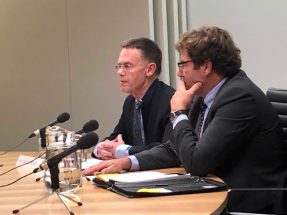An inquiry into the roll-out of driverless transport has heard Australia must implement a national strategy to upskill transport workers if it wants to avoid massive job losses.
Australia’s transport union has urged the government to fund a national future transport work strategy to prevent massive job losses arising from the emergence of driverless modes of transport.
Without a proper strategy to upskill transport workers, the advent of autonomous vehicles (AVs) could “decimate” transport workers, a parliamentary inquiry into automated mass transit in Sydney heard on Thursday.
Dominic Ofner, executive officer at the Rail Tram and Bus Union (RTBU) told the inquiry that governments need to collaborate with transport workers to ensure the advent of AVs doesn’t displace thousands of transport workers’ jobs.
Mr Ofner called on the government to launch a workforce development strategy, in partnership with state governments, to position transport workers for the “jobs of the future.”
“The focus should be on job enhancement and upskilling, not job replacement,” he said.

In submissions to the inquiry, the RTBU also called on the Federal Government to collaborate with transport workers on the development of AV regulations and to be prepared to negotiate with unions.
“It’s hard to engage [with government] when the prevailing view coming out is ‘we can’t wait to deal with driverless trains because we won’t have to deal with the union,’” he said.
Preventing an AV ‘nightmare’
Australia’s planning institute told the inquiry that the government should leverage the AV revolution to transform urban environments.
But to prevent an “AV disruption nightmare” Australia must consider how AV can lead to improved investment in city planning.
John Brockhoff, policy advisor and planner at the Planning Institute of Australia told the inquiry that it is essential to focus on how the AV revolution can promote urban regeneration.
“Achieving and adopting strategic planning and transport goals for cities is what should drive this debate and what the arrival of AV can do to help us make cities great places to live and work,” he said.

Colin Henson from the PIA told the inquiry that the advent of AVs might provide an opportunity to rethink the way we design our urban environments in line with key transport hubs, while the introduction of road pricing could potentially help incentivise these investments in urban regeneration, Mr Brockhoff said.
The Committee for Sydney’s CEO Gabriel Metcalfe told the inquiry the transport revolution presents an opportunity to reclaim space inside cities and make them more liveable and convenient, with potentially “profound” implications for how cities work.
Warnings not to repeat “sins of the past”
City planners need to design cities carefully for the advent of AV and not to “repeat the sins of the past with endlessly sprawling areas” the chair of the Committee John Alexander warned.
City planners and transport operators should work together to create the most “efficient” designs for cities that are compatible with our future transport system, he said.
“Deeply we have to look at the way cities are planned so we’re not retrofitting transport solutions around bad design which has made up the sins of the past,” he said.
Governments need to fundamentally rethink the way they are organised to accommodate this fundamental shift in urban planning that is needed to accommodate the advent of AV, Mr Brockhoff said.
“There is an enormous opportunity for innovation in the way we organise ourselves as a government, how we look to fund institutions to deliver infrastructure and services and look ultimately to restructure government to achieve these goals,” he said.
Comment below to have your say on this story.
If you have a news story or tip-off, get in touch at editorial@governmentnews.com.au.
Sign up to the Government News newsletter.




Leave a Reply